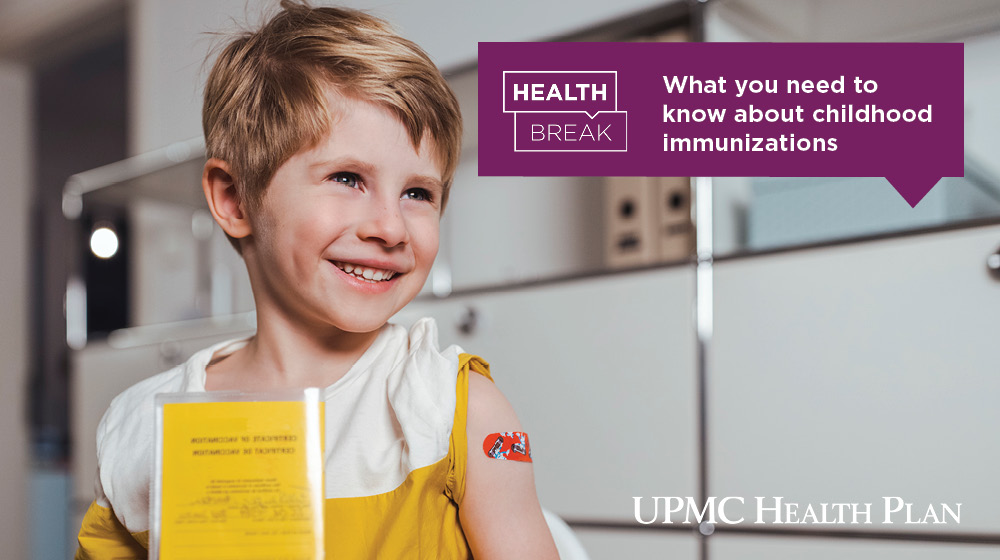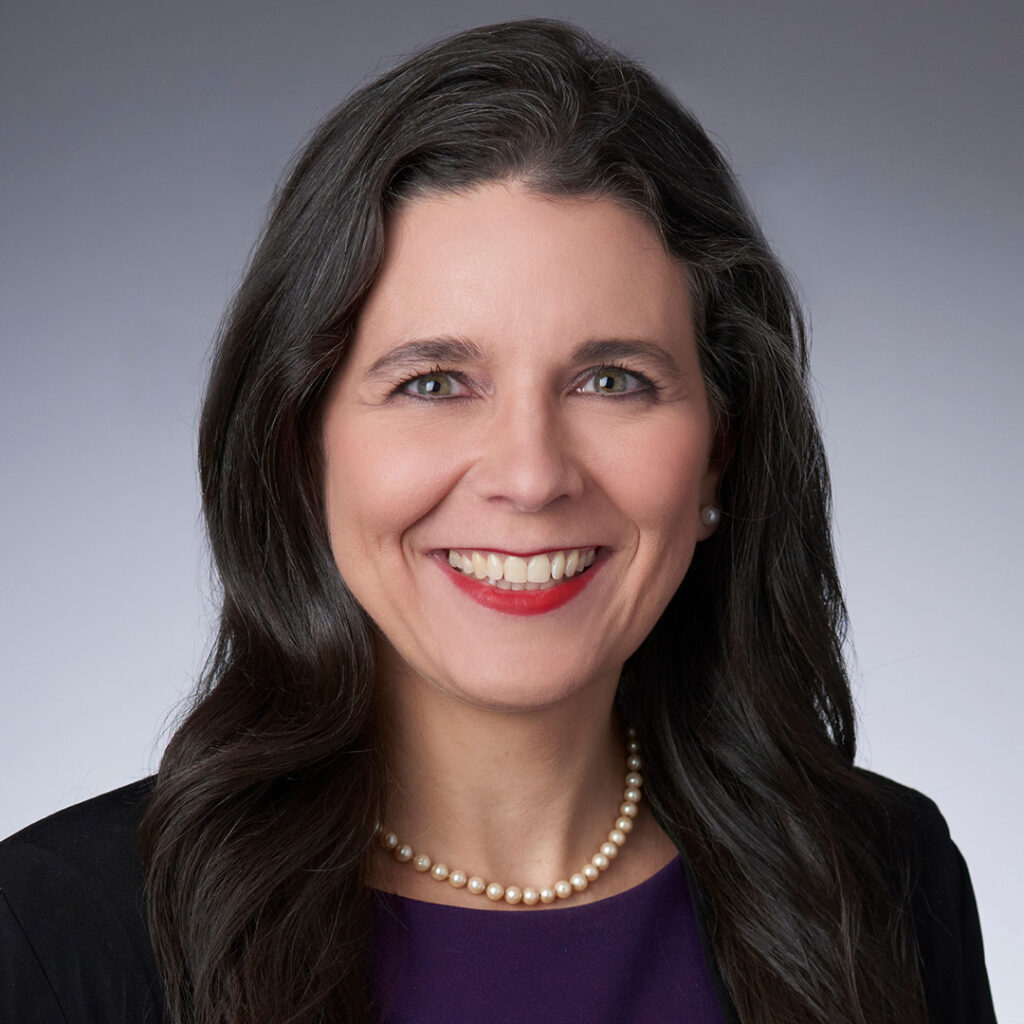Health Break: What you need to know about childhood immunizations

A podcast for UPMC Health Plan members, Health Break is your quick guide to caring for your mental and physical health, prioritizing wellness, and making the most of your health insurance plan.
Episode 36: Take a Health Break with Dr. Johanna Vidal-Phelan
Dr. Johanna Vidal-Phelan takes a Health Break to discuss why vaccines are important at every stage of childhood.
Episode transcript:
Camille: Welcome to Health Break by UPMC Health Plan, your quick guide to health, wellness, and how to make the most of your health insurance plan. I’m your host, Dr. Camille Clarke-Smith. I help to oversee the quality of the plans and programs we offer at UPMC Health Plan.
Angelo: And I’m your co-host, Angelo Bartic. I’m a health coach who works with our members on making healthy lifestyle habits and setting goals. This is your…Health Break.
Hey everyone, it’s Angelo Bartic. Today we’re talking with Dr. Johanna Vidal-Phelan about the safety and importance of vaccines and immunizations through every stage of childhood. Dr. Vidal-Phelan, thank you so much for being with us today.
Dr. Vidal-Phelan: Thank you for having me.
Angelo: It’s our pleasure. Why are vaccinations important and how do we know that a vaccine is safe and effective?
Dr. Vidal-Phelan: Immunizations are one of the most important accomplishments in health care. Because of immunization, children and teenagers are protected against potentially life-threatening diseases like polio or measles, for example. A common question parents, caregivers, and grandparents ask me as a pediatrician is, are vaccines safe and effective? I usually start answering that question by sharing from my own experience as a mother of two sons that are fully vaccinated. As a parent, I chose to vaccinate my children because I am committed to protecting them against diseases that are preventable and could potentially harm them. I have never regretted my decision to vaccinate my children, including the influenza vaccine, COVID-19 vaccines, and the human papilloma virus vaccines. I also share with parents and caregivers that vaccines are extensively tested to ensure their safety and effectiveness. The Centers for Disease Control and Prevention, or CDC, and the Food and Drug Administration, FDA, take many steps to guarantee vaccine safety both before and after vaccines are available to the public. Vaccine safety is a critical priority not only for the CDC and the FDA, but also to pediatricians like me, family doctors, physicians, and providers that administer immunizations daily to our patients.
Angelo: Thank you so much for the information and more importantly, we really appreciate you sharing your perspective. What are some of the immunizations that children should have at different stages?
Dr. Vidal-Phelan: That is a great question. As a pediatrician, I follow the recommended childhood and adolescent immunization schedule that is approved by the American Academy of Pediatrics and the Centers for Disease Control and Prevention and other leading medical organizations. The immunization schedule recommends the age when children and teens should receive vaccines. I always advise parents and caregivers to follow the recommended immunization schedule to offer the best protection to children and teenagers from preventable conditions. It is important to note that schedules may be different for children with certain chronic medical conditions or weakened immune systems, and for those that require catchup immunizations. Children receive what is called their primary series of vaccines, beginning at birth through ages 15 to 18 months of age. These vaccines help to protect against certain type of life-threatening brain or blood infections and preventable diseases like whooping cough, chickenpox, polio, and measles. Between the ages of four to six years, children receive booster shots for diseases like whooping cough, polio, measles, and others, and additional vaccinations are also given to children between the ages of nine to 12 and 16 and 18 years of age. These include vaccines like human papillomavirus vaccinations that can help prevent against certain types of cancer, meningococcal vaccines that help protect against bacteria that causes meningitis, which is a brain infection, and boosters against tetanus, diphtheria, and whooping cough.
Angelo: We understand that there sometimes can be hesitancy around vaccines. What would you say to someone who might feel hesitant about vaccines for their kids?
Dr. Vidal-Phelan: First, I always start by recognizing, and I understand that parents and caregivers may express hesitancy against vaccines. I am concerned with the amount of misinformation targeting young parents and families. If you are obtaining your medical information from sources like social media, you may read information that may not be true and purposely creates fear and mistrust against vaccines. I want to start by acknowledging your fears and concerns. As a pediatrician, I know that building trust with our patients and families is vital. We want to hear from you when you have questions or concerns. If you are hesitant or confused about vaccinations, I advise that you reach out to your primary care provider and use internet resources that are validated by the CDC and medical organizations like the American Academy of Pediatrics or the American Academy of Family Physicians. Don’t be afraid to ask your questions, as we want you to feel confident in your decision to immunize your children. Personally, as a mother, I chose to immunize my children because I wholeheartedly believe in the efficacy and the safety of vaccinations.
Angelo: Thank you so much, Dr. Vidal-Phelan, for discussing the safety and importance of vaccines and immunizations for children and taking a Health Break with us.
Dr. Vidal-Phelan: Thank you for having me.
Angelo: Call your child’s health care provider to talk about any immunizations your child may need to receive to stay healthy.
Find show notes and more information at upmchealthplan.com/podcast. Join us as we continue exploring health, wellness, and how to make the most of your health insurance plan in the next episode of Health Break.
This podcast is for informational and educational purposes. It is not medical care or advice. Individuals in need of medical care should consult their personal care provider. Views and opinions expressed by the hosts and guests are solely their own and do not necessarily reflect those of UPMC Health Plan and its employees.
En español:
Jonathan Encarnación: Bienvenido a un episodio especial de Health Break, o Pausa de Salud, en español. El pódcast Pausa de Salud de UPMC Health Plan es su guía rápida a la salud, el bienestar y cómo aprovechar al máximo su plan de seguro médico.
Soy su anfitrión, Jonathan Encarnación. Apoyo a nuestros miembros en el centro de Pennsylvania ayudándoles a familiarizarse con todas las formas en que pueden acceder a la atención que necesitan para recibir o mantenerse saludables. Esta es su… Pausa de Salud.
Hoy estamos hablando con la Dra. Johanna Vidal-Phelan, pediatra practicante y directora médica del Departamento de Calidad en UPMC Health Plan. Ella hablará sobre la seguridad e importancia de las vacunas y las inmunizaciones en todas las etapas de la niñez. Dra. Vidal-Phelan, muchas gracias por acompañarme hoy. Primero, me gustaría saber: ¿Por qué son importantes las vacunas y cómo sabemos que son seguras y efectivas?
Dra. Vidal-Phelan: Las vacunas son uno de los logros más importantes en el cuidado de la salud. Gracias a la inmunización, los niños y adolescentes están protegidos contra enfermedades potencialmente mortales como el polio o el sarampión, por ejemplo. Una pregunta común que los padres, cuidadores y abuelos me hacen como pediatra es, son seguras y efectivas las vacunas? Por lo general, comienzo a responder esta pregunta compartiendo mi propia experiencia como madre de dos hijos que están completamente vacunados. Como madre, elegí vacunar a mis hijos porque estoy protegiéndolos contra enfermedades que se pueden prevenir y qué pueden causarles daño. Nunca me he arrepentido de mi decisión de vacunar a mis hijos, incluyendo la vacuna contra la influenza, las vacunas contra el coronavirus y las vacunas contra el virus del papiloma humano.
También comparto con los padres y familias que las vacunas se estudian de una manera extensiva para garantizar su seguridad y eficacia. El centro para el control y la prevención de enfermedades, o CDC, y la administración de alimentos y medicamentos, FDA, toman muchas medidas para garantizar la seguridad de las vacunas antes y después de que están disponibles para el público. La seguridad de las vacunas es una prioridad fundamental, no solamente para el CDC o el FDA, si no también para los pediatras como yo, los médicos de familia y los proveedores que administramos vacunas diariamente a nuestros pacientes.
Jonathan Encarnación: También tengo entendido que no todas las vacunas se ministran de la misma manera. ¿Cuáles son algunas las vacunas que los niños deberían recibir en diferentes etapas de su vida?
Dra. Vidal-Phelan: Esta es una muy buena pregunta. Como pediatra, sigo el calendario de vacunación recomendado para niños y adolescentes aprobado por la academia estadounidense de pediatría, los centros para el control y la prevención de enfermedades y otras organizaciones médicas líderes. El calendario de vacunación recomienda la edad en que los niños y adolescentes deben recibir la vacuna. Aconsejo a los padres y cuidadores que sigan el calendario de vacunación recomendado para ofrecer la mejor protección a los niños y adolescentes de enfermedades prevenibles. Es importante tener en cuenta que el calendario de vacunación puede ser un poco diferente para niños con ciertas condiciones médicas crónicas o un sistema inmunitario debilitado y para aquellos que están atrasados con sus vacunas. Los niños reciben lo que se llama su serie primaria de vacunas desde el nacimiento hasta los 15 a 18 meses de edad.
Estas vacunas ayudan a proteger contra ciertos tipos de infecciones del cerebro o de la sangre y enfermedades prevenibles como la tosferina, la varicela, el polio y el sarampión. Entre las edades de cuatro a seis años, los niños reciben vacunas de refuerzo para enfermedades como el polio y el sarampión. Hay vacunas adicionales entre los nueve y los 12 años y entre los 16, los 18 años .Están incluyes vacunas como la vacuna contra el virus del papiloma humano, que puede ayudar a prevenir ciertos tipos de cáncer. Vacunas que ayudan a proteger contra la bacteria que causa la meningitis, una infección cerebral y refuerzos contra el tétano, la difteria y la tosferina. Mi consejo para los padres, cuidadores y abuelos es que si tienen alguna pregunta sobre las vacunas, comuníquese con su pediatra medicina de familiar familiar o proveedor de su hijo o hija. Nosotros, los pediatras, conocemos el historial de salud de su hijo o hija, y podemos aconsejarle sobre las vacunas que necesita. Para obtener información adicional sobre las vacunas recomendadas para los bebés, los niños y adolescentes, visite la página del internet del CDC.
Jonathan Encarnación: Muchas padres y cuidadores de niños a veces pueden dudar sobre las vacunas por diferentes razones. ¿Qué le diría a usted, a los padres o a alguien que se siente inseguro acerca de vacunar a su hijo?
Dra. Vidal-Phelan: Primero, yo reconozco y entiendo que los padres pueden expresar dudas sobre las vacunas. Me preocupa la cantidad de información errónea dirigida a padres y familias jóvenes. Si está obteniendo su información médica de fuentes como las redes sociales, tiene que saber que puede estar leyendo información que no es cierta y que deliberadamente crea miedo y desconfianza en contra de las vacunas. Siempre empiezo la conversación con mis padres de familia reconociendo sus miedos y preocupaciones. Cómo pediatra, sé que ganar la confianza de nuestros pacientes y familias es muy importante. Si usted tiene preguntas e inquietudes sobre las vacunas, queremos escuchar de usted. Si tiene dudas o está confundido acerca de las vacunas, le aconsejo que se comunique con su proveedor de atención primaria y usa recursos del internet validados por CDC y organizaciones médicas como la academia estadounidense de pediatría o la academia estadounidense de médicos de familia y otros. No tenga miedo de hacer sus preguntas, ya que queremos que se sienta seguro de su decisión de vacunar a sus hijos. Personalmente, como madre, yo elegí á inmunizar á mis hijos porque yo creo en la eficacia y la seguridad de las vacunas.
Jonathan Encarnación: Muchas gracias, Dra. Vidal-Phelan, por tomar una Pausa de Salud con nosotros hoy y discutir la seguridad y la importancia de las vacunas e inmunizaciones para niños.
Llame al proveedor de atención médica de su hijo para hablar sobre cualquier vacuna que su hijo deba recibir para mantenerse saludable.
Escuche Pausa de Salud en inglés para continuar explorando la salud, el bienestar y cómo aprovechar al máximo su plan de seguro médico. Visite upmchealthplan.com/podcast o encuentre Pausa de Salud en inglés en la plataforma de streaming de pódcast favorita.
Este pódcast es para propósitos informativos y educativos. No es atención o consejo médico. Las personas que necesitan atención médica deben consultar a su proveedor de atención personal. Las opiniones y opiniones expresadas por los anfitriones y los huéspedes son únicamente suyas y no reflejan necesariamente las de UPMC Health Plan y sus empleados.
Related to this episode:
- Pediatric preventive health information
- Child and Adolescent Immunization Schedule from the CDC
- Teach the child in your life about vaccines with our Daniel Tiger’s Neighborhood audio story
About Dr. Johanna Vidal-Phelan:
Johanna Vidal-Phelan, MD, MBA, FAAP, is the Chief Medical Officer, Quality Department for UPMC Insurance Services Division and Clinical Assistant Professor of Pediatrics at the University of Pittsburgh School of Medicine. Dr. Vidal-Phelan graduated with a bachelor’s degree in biology from Wellesley College and completed her Doctor of Medicine from UMDNJ-Robert Wood Johnson Medical School in New Jersey and was awarded the Sidney J. Sussman, MD Award for Academic Excellence in Pediatrics. She completed her General Pediatrics Internship and Residency at the University of Washington Seattle Children’s Hospital and a health care-focused master’s in business administration from George Washington University School of Business. Dr. Vidal-Phelan has over 20 years of experience in clinical practice and has been a thought leader in the field of value-based care, population health, care management and social determinants of health.




